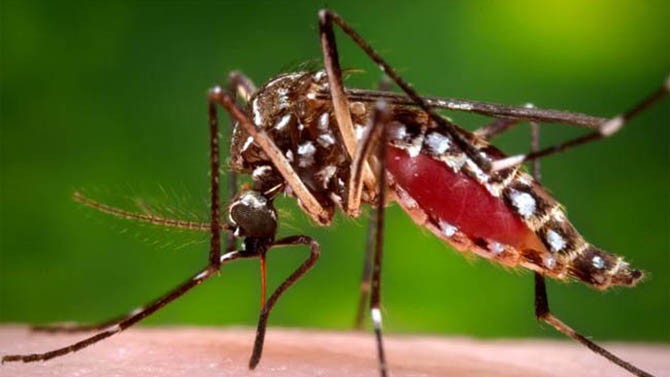Seniors challenged to develop vaccine and diagnostic test for Zika virus
Zika virus was first discovered in 1947, but for more than six decades it was regarded as more of a nuisance than a public health emergency — the illness is usually mild, with symptoms lasting a few days to a week after the victim is bitten by an infected mosquito.
But 2015 witnessed an alarming connection between the virus and birth defects in children born to infected women, and the quest was on for a test to diagnose the disease and a vaccine to prevent it.
One of the “companies” engaged in that quest over the past several months was UDefend, a fictitious manufacturer of biologic vaccines and diagnostics set up at the University of Delaware to challenge chemical engineering seniors in a capstone course, CHEG432 – Chemical Process Analysis. Student teams worked with pairs of advisers from academia and industry in carrying out their projects.
“The Zika virus has heartbreaking consequences for individuals with neurological complications, for pregnant women, and for new mothers with affected babies,” says Sujata Bhatia, professor of chemical and biomolecular engineering who co-advised five student teams with DuPont researcher Steve Lustig.
“Yet there is no available vaccine or therapy for Zika virus, and there is no reliable diagnostic test to track the spread of the virus. So this seemed like the perfect real-world challenge for our students.”
The students were told that the World Health Organization and the Centers for Disease Control and Prevention had engaged the leaders of major biopharma companies, including UDefend, to combat the Zika virus outbreak. They were charged with evaluating the challenges and opportunities associated with the introduction of a Zika virus vaccine and an associated rapid diagnostic test.
Each team conducted a feasibility study, considering technical and business feasibility as well as social factors, and then made a recommendation as to whether or not UDefend should pursue the production of a Zika virus vaccine and test. With the decision to move forward, they then suggested prices for the products and identified public policies for distributing them to the global community.
After writing a comprehensive 73-page report, “Stage Gate Development of rVSV Vaccine and Diagnostic Test for the Zika Virus,” Team T — Brendan Buckbee, Daphne Collias, and Jonathan Galarraga — stepped up to the podium in Room 366 Colburn Lab on Monday, May 16, to present their findings.
They had 20 minutes to cover project requirements, market challenges and barriers to entry, value-chain assessment, manufacturing, profitability analysis, and recommended action. They finished with four seconds to spare, recommending that UDefend proceed, with initial prices of $50 for the vaccine and $7 for the diagnostic test.
One of their more interesting recommendations was that the manufacturing plant be constructed in Brazil, the epicenter of the Zika outbreak.
“Even though we knew that we were just pretending to be a large company with significant assets, going through the entire thought exercise taught us a lot about how products are developed and then disseminated to meet customer needs,” said Galarraga. “We were really challenged on what it would be like to work on a project that has the potential to make a difference in the world.”
Collias found it exciting to work on such a contemporary problem. “Every day, new articles about Zika virus popped up in the news,” she said. “It will be interesting to see what actually happens with the development of a vaccine and a test for it.”
Both Bhatia and Lustig were pleased with the work done by the student teams.
“They learned an amazing amount about vaccines, epidemics, clinical trials, regulations, global health, economics, and manufacturing in just two months,” Bhatia said. “Each of the five teams took a unique technical approach to the Zika threat. The students’ work shows the power of a chemical engineering education.”
On Tuesday, May 17, the day after the students presented their work, the U.S. Senate voted to advance $1.1 billion in emergency financing to combat the Zika virus.
In a statement following announcement of the funding, U.S. Sen. Tom Carper (D-Del.) said, “Congress, the Administration, and state and local governments have a responsibility to the American people to fully combat the health risks posed by Zika. Just like with our response to Ebola, our response to Zika must be an all-hands-on-deck effort.”

